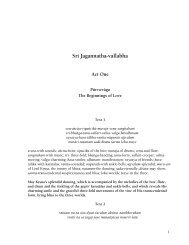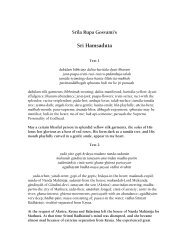Srimad Bhagavatam, Volume 3
Srimad Bhagavatam, Volume 3
Srimad Bhagavatam, Volume 3
Create successful ePaper yourself
Turn your PDF publications into a flip-book with our unique Google optimized e-Paper software.
world because they are self satisfied by the great achievements of devotional<br />
service. As explained before, Sukhdeva Goswami never accepted any formal<br />
spiritual master neither did he underwent any formal reformatory<br />
performances. His father was his natural spiritual master because he heard<br />
"<strong>Srimad</strong> Bhagwatam" from his great father Vyasdeva and after this he became<br />
completely self satisfied and as such he was not dependant on any formal<br />
process. The formal processes are necessary for those who are expected to<br />
reach to the stage of complete liberation but Sri Sukhdeva Goswami was<br />
already in that status by the grace of his father. As a young boy he was<br />
expected to be properly dressed but naked as he was disinterested to social<br />
customs, he was neglected by the general populace and inquistive boys and<br />
women surrounded him as if a rejected madman is so surrounded. He thus<br />
appears on the scene while travelling on the earth by his own accord. It<br />
appears that on the enquiry of Maharaj Parikshit from the great sages, they<br />
were not unauimous in their decision as to what and what was to be done. For<br />
spiritual salvation there were many prescriptions according to the differeut<br />
modes of different persons. But the ultimate aim of life is to attain the highest<br />
perfectional stage of devotional service of the Lord. As the doctors differ so<br />
also the sages differed by their different prescriptions and while such things<br />
were going on, the great powerful son of Vyasadeva appeared on the scene.<br />
Tam dwasta varaam sukumara pada<br />
Kara uru bahbam sakapola gatram<br />
Charu ayata akaha utnasa tulya karna<br />
Subhru ananam kambu sujata kantha.<br />
Tam—him, Dwastya—sixteen, Varsa—years, Sukumara-delicate, Pada—<br />
legs, Kara—hands, Uru—thighs, Bahbam—arms, Ansa—shoulder, Kapola—<br />
forehead, Gatram—body, Charu—beautiful, Ayata—broad, Aksha—eyes,<br />
Utnasa—hingh nose, Tulya—similir, Karna—ears, Svbhru—nice brows,<br />
Ananam—face, Kambu—conchshell, Sujata—nicely built, Kantha—neck.<br />
The son of Vyasdeva was only sixteen years old. His legs. hands, thighs,<br />
arms, shoulder, forehead, and other parts of the body were all delicate.<br />
His eyes were broad and beautiful, nose raised highly, the ears were<br />
similar, attractvive face, ond the neck beautifully lined up like that of a<br />
conchshell.<br />
Respectable personality is described beginning from the legs and the<br />
honoured system is observed here in the case of Sukdeva Goswami although<br />
he was only sixteen years of age. A person is honoured by his achievements<br />
and not necessarily by advanced ages. A person can be older by experience<br />
and not by ages. Sri Sukadeva Goswami who is described herein as the son of<br />
Vyasadeva was more experienced than all the sages persent there by his<br />
knowledge although he was only sixteen years old.<br />
Nigudha jakram prithu tunga bakaham<br />
Avarta nabhim valibalgu udaram cha<br />
Digambaram vaktra vikirnakesham<br />
Pralamba bahum swamarottama abham.<br />
Nigudha—covered, Jakram—color bone, Prithu—broad, Tumga—swollen,<br />
Baksham—Chest, Avarta—whirled, Nabhim—Naval, Valibalgu—striped,<br />
Udaram—abdomen, Cha—also, Digambarm—dressed by all<br />
directions(naked) Vakram—curled, Vikirna—scattered, Kesham—hair,<br />
Pralamba—elongated, Bahum—hands Swamarottama—the best amongst the<br />
gods(Krishna) Abham—hue.<br />
His color bone was covered with skin, chest broader and swollen, naval<br />
screw like deep and abdomen was beautifully striped. His arms were<br />
elongated and curled hair was strewn over his beautiful face. And naked<br />
although he was his hue of the body reflected that of Lord Krishna.<br />
The specific signs of his bodily featunes indicated his distinction from the<br />
common men. All the signs described in connection with the bodily features<br />
of Sukdeva Goswami are uncommon symptyoms of great personality<br />
according to physiognomical calculation. His bodily hue represented that of<br />
Lord Krishna who is the Supreme amongst the gods, demigods, human beings<br />
and all living beings.<br />
Shyamam sada apivyvavaya amga lakshmya<br />
Strinam manojnam ruchira smitena.<br />
Pratyutthitaste munayoh swa asan ebhyo<br />
Tat lnkasanaja api gudhavarchasam<br />
Shayamam—blackish, Sada—always, Apivya—excessively, Vaya—age,<br />
Anga—symptoms, Lakshya—by the opulence of, Strinam—of the fair sex,<br />
Manojnam—attractive, Ruchira—beautiful, Smitena—smiling,<br />
Pratyutthitas—stood up, Te—all of them, Munayah—the great sages, Swa—<br />
own, Asanebhya—from the seats, Tat—those, Laksanajna—expert in the<br />
knowledge, Gudhavarchasam—covered glories.<br />
He was blackish and very beautiful on account of his young age. By the<br />
glamour of his body and attractive smiling he was pleasing to the fair sex.<br />
Although he covered his natural glories, the great sages present were all<br />
expert in the art of phyiognomy and thus they honoured him by standing<br />
up from their own seats.<br />
73<br />
Nineteenth Chapter - Appearance of Sukadeva Goswami<br />
Sa vishnurato atithaya agataya<br />
Tasmai saparyam sirasa jahara.<br />
Tato nivritta hi abudhah striyo arbhaka<br />
Mahasane sa upavivesha pujitah.<br />
Sa—he, Vishnurata—Maharaj Praikshit (who is always protected by the Lord<br />
Vishnu), Atithaya—to become a guest, Agataya—one who arrived there,<br />
Tasmai—un to him, Saparyam—with all body, Sirasa—with his head down,<br />
Jahara—offered obeisances, Tato—there after, Nivritta—ceased, Hi—<br />
certainly, Abudha—less intelligent, Striya—women, Arbhaka—boys,<br />
Mahasane—exhalted seat, Sa—he, Upavisvesha—sat down, Pujitah—being<br />
respected.<br />
Maharaj Prikshit who is also khown as the Vishnurata, then bowed down<br />
with his head to receive the chief guest Sukdeva Goswami. At that time<br />
all less intellgent women and boys ceased to follow him and thus being<br />
respected by all, Sukdeva Goswami took his exhalted seat.<br />
On arrival of Sukdeva Goswami in the meeting every one of them except Srila<br />
Vyasadeva, Narada and few others, stood up from their seats and Maharaj<br />
Parikshit was too glad to receive a great devotee of the Lord and thus he<br />
bowed down before him with all the limbs of his body. Sukadeva Goswami<br />
also exchanged the greetings and reception by embrace, shaking of hand,<br />
nodding and bowing down specially before his father and Narada Muni and<br />
thus he was offered the presidential seat in the meeting. When he was so<br />
being received by the king and the sages the street boys and the less intelligent<br />
women who followed him, were struck with wonder and were affraid of them.<br />
So they retired from their frivolous activities and everything was full of<br />
gravity clam quiteness.<br />
Sa samvritas tatra mahan mahiyasam<br />
Brahmarsi rajarsi devarsi samghaih.<br />
Vyarochata alam bhagawan yatha indur<br />
Graharkha tara nikaraih paritah.<br />
Sa—Sri Sukdeva Goswemi, Samvritas—surrounded by, Tatra—there,<br />
Mahan—great, Mahiyasam—of the greatest, Brahmarsi—saint among the<br />
brahmins, Rajarsi—saint among the kings, Devarsi—saint among the<br />
demigods, Samghaih—by the assembly of, Vyarochata—well deserved,<br />
Alam—oh what to speak, Bhagwan—the powerful, Yatha—as, Indur—the<br />
moon, Graha—planets, Rikha—heavenly bodies, Tara—stars, Nikaraih—by<br />
the assembly of, Paritah—surrounded by.<br />
Sukdeva Goswami was thus surrounded by saintly sages demigods and<br />
kings just like the moon is surrounded by stars heavenly bodies and<br />
planets in the sky. He was gorgeously represented in that manner and<br />
factually he was also respected by all of them.<br />
In the great assembly of saintly personalities, there was Vyasadeva the<br />
Brahmarsi, Narada the Devarsi, Parsurama the great ruler of the Kshatriya<br />
kings etc. Some of them were powerful incarnations of the Lord. Sukdeva<br />
Goswami was not known as Brahmarshi, Rajarsi or Devarsi neither he was an<br />
incarnation like Narada, Vyasa or Parsurama etc. And yet he excelled in<br />
respects than all of them. This means the devotee of the Lord is more<br />
honoured in the world than the Lord Himself. One should therefore never<br />
minimise the importance of a devotee like Sukedeva Goswami.<br />
Presantam asinamakuntha medhasam<br />
Munim nripo bhagawatah abhyupetya.<br />
Pranamya murdhna avahita kritanjalir<br />
Natwa gira sunritaya anwaprichhat.<br />
Prasantam—perfectly pacified, Asinam—sitting, Akuntha—without any<br />
hesitation, Medhasam—one who has got the required brain, Munim—unto the<br />
great sage, Nripa—the king (Maharaj Parikshit) Bhagwatah—the great<br />
devotee, Abhyupetya—going nearer to him,Prananya—bowing down,<br />
Murdhna—by his head Avahita—properly,—Kritanjali—with folded hands,<br />
Natwa—politely, by words, Sunritaya—in sweet voices, Anwaprichhat—<br />
enquired.<br />
The great devotee Maharaj Parikshit, then going nearer to the sage Sri<br />
Sukdeva Goswami who was sitting perfectly pacified and had the<br />
necessary brain to answer everything unhesitatingly, offered again his<br />
respects by bowing down before him and very politely enquired from him<br />
in sweet words with folded hands.<br />
The gesture, now adopted by Maharaj Parikshit in the matter of questioning a<br />
master is quite befitting in terms of scri ptural injunction. The scriptural<br />
injunction is that one should humbly approach a spiritual master for<br />
understanding the transcendental science. Maharaj Parikshit was now<br />
prepared for meeting his beath and within a very short time of seven days he<br />
was to know the process of entering the kingdom of God. In such important<br />
cases only one is required to approach a spiritual master. There is no necessity<br />
of approaching a spiritual master unless one is not in need of solving the<br />
problems of life. One who does not know how to put questions before the<br />
spiritual master has no business to go there. And the qualification of the<br />
spiritual master is perfectly manifested in the person of Sukdeva Goswami.












